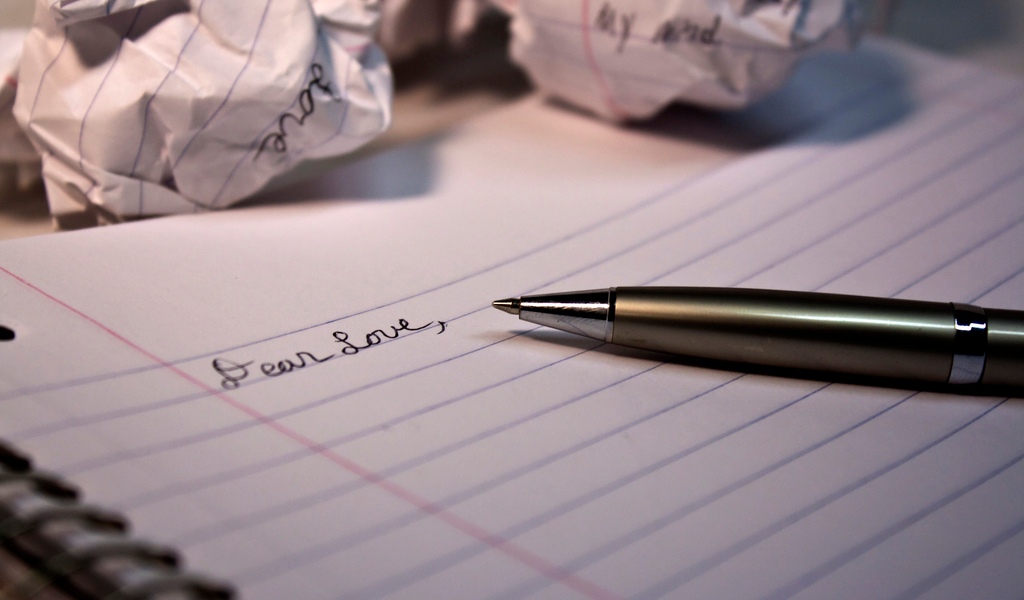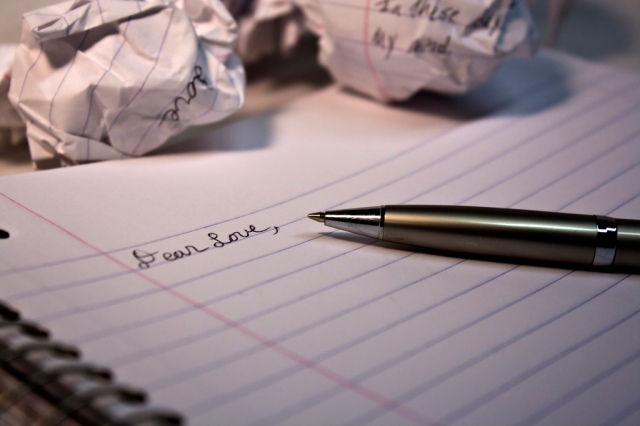Want to try writing an open letter? Take a look at these examples for inspiration.
The open letter. You’ve seen ’em before, I’m sure. If not, they can look something like this:
Dear Monday,
I must admit I’m never happy to see you. I dread you in the morning, and on the drive to work, and from what I see on my Facebook feed, no one else likes you, either.
Why you gotta be so gloomy?
Sincerely,
Cheri
Sure, it’s a silly example. But it’s a different, more creative approach than simply typing:
I have a bad case of the Mondays.
Pen and paper image by Arron Patton, CC BY 2.0
Here on The Daily Post, we talk about different approaches to your writing — to practice and hone, and to discover new ways to express yourself. The open letter, a popular format we see more and more across the internet, is a structure worth trying for a new post and fitting for all kinds of writing, from social and political commentaries to personal musings. It can be a letter for a large audience, or for a specific individual. Either way, it’s public, intended to be widely circulated.
Looking to give your site a boost and reach new audiences? From a custom domain to advanced SEO tools and more design options, there’s a WordPress.com plan that’s right for you.
Let’s see how several WordPress.com bloggers employed the open letter to create their recent popular posts:
An Open Letter to Paula Deen on Afroculinaria
Culinary historian Michael W. Twitty penned this thoughtful open letter to Paula Deen at the end of June, in light of the controversy surrounding the chef and cooking show host’s derogatory remarks of African Americans.
Don’t forget that the Southern food you have been crowned the queen of was made into an art largely in the hands of enslaved cooks, some like the ones who prepared food on your ancestor’s Georgia plantation.
While Michael’s post would have still worked and resonated with readers if written as a straightforward piece of opinion or commentary, the angle he uses is more personal and direct, and much more effective.
Don’t be fooled by the claims that Black people don’t watch you. We’ve been watching you. We all have opinions about you.
The intimate yet public nature of an open letter draws readers in, in an emotional way — it can be an effective method to spark a discussion between people who strongly identify (or disagree) with you.
An Open Letter to My Son on His First Birthday on Fueled by Diet Coke
Writer and mother Lindsay Durrenberger wrote a heartfelt open letter to her one-year-old son, Dax. The post is very personal, and it almost feels, especially with the accompanying photographs of her with her baby, that we’re intruding on a private space. Yet despite the details she shares about his milestones — when he got his first tooth, or when he first said “dada” — she writes something quite universal:
Dax, a year ago, you turned my whole world upside down. You took what I knew about life and love and you shook it all up and rebuilt it into something beautiful, something I don’t fully understand.
Thank you for letting me be your mommy that day a year ago, and thank you for continuing to let me be your mommy today.
When done right, an open letter isn’t simply for the person to whom it’s addressed, is it? Here, Lindsay’s positive, loving letter is for other mothers — especially new ones — and their children, too.
An Open Letter to White People About Trayvon Martin on Opine Season
After hearing about the George Zimmerman verdict, Kyle “Guante” Tran Myhre, a contributor at Opine Season, an op-ed collective of writers, published an open letter to white people — “especially to those white people who understand that something terrible has happened, and has been happening, and will continue to happen, but don’t know what to do.”
We read a number of impassioned responses to this trial — many heated and angry — along with the comment discussions that were generated. We appreciated Kyle’s post, which he used as a springboard to encourage awareness and action. He begins his open letter:
In the next few days, there are going to be a lot of essays and op-eds attempting to make sense of, or grapple with, or process the Zimmerman verdict, from writers who are better than me . . .
And throughout, with patience and hope, he urges us to stop and think:
We also need to act on those thoughts, to cultivate an awareness that can permeate our lives and relationships. When people of color share personal stories about racism, our immediate response has to stop being “but I’m not like that.” Just listen.
Think about handwriting a letter — how you’ve scribbled thoughts onto paper in private, for one specific person to read. It’s an intimate, revealing process, transformed in our digital age as this type of open letter that Kyle produces here. Addressing a post to someone specific (and then signing off with your own name) adds a layer of vulnerability and extra weight to your words. In a way, you’re saying: “Yes, I’m directing this to you, in public, and I stand by everything I’ve said.”
In addition, taking ownership of a letter emphasizes a writer’s unique perspective. After all, your response is just one point of view on a topic. Here, Kyle makes it clear that he’s just one of many writers sharing their thoughts on the verdict, but also hopes his reader spends the few moments to consider what he has to say, too.
The [Open] Letter to My Father That He Will Never Read on Thoughts of a Lunatic
Erica’s recent letter to her father is raw and honest — like the letters above, it’s intensely personal, and there’s a vulnerability here that attracts her readers, whether or not they relate to the subject matter.
I didn’t blame you for the perils of my life. I didn’t blame you for the molestation. I didn’t blame you for abandoning me. I didn’t blame you for forgetting about me.
Erica addresses this open letter to her father, even though it’s something he’ll never read. So…why write a letter if your addressee won’t see it? This piece illustrates just how powerful the open letter as a literary device can be — you can use it to structure your deepest thoughts, and transform personal musings into a dialogue worth sharing with others. In the best pieces, readers may see their own flaws or hardships, too.
Yesterday, Dad, I found you.
And yesterday, Dad, you turned me away.
Write your own open letter
You can use these examples as inspiration for your own open letter, but also consider different approaches:
- A humor or satirical piece addressed to a celebrity or person in the news.
- A piece of constructive criticism (or praise) to a politician, either international or local.
- A letter to a thing — one of your fears, a habit you’d like to break, etc.
- A note to yourself at a specific age/year in the future.
What other ideas for open letters do you have?
Whatever approach you take, remember that trusting your unique point of view (and allowing yourself to be vulnerable) can encourage meaningful engagement from your readers. Talk directly to the person or people you’re addressing — refer to them by name in your letter. Picture your addressee in your mind as you type, or better yet, first draft the post by hand, and let that private process of handwriting a letter move you. Above all, approach this piece as an intimate conversation between you and someone or something else — you’ll be surprised by what spills out of you onto the page.
For more open letter samples, take a peek at these posts:
- An Open Letter to New Teachers
- An open letter to the creators, cast, and crew of How I Met Your Mother
- A Love Letter to Italy
You might also enjoy these related posts:
- Try a New Point of View: One Topic, Three Takes
- Philosophy of Composition
- The Ghosts in Your Dashboard
Currently blogless? You’re a click away from sharing your story.
Create your blog at WordPress.com

I loved this suggestion! Had a great laugh writing it. Thanks! Here is my contribution:
An Open Letter: Dear Memory
http://dewberrywood.wordpress.com/
LikeLike
Reblogged this on stojkoman.
LikeLike
Reblogged this on Papercuts.
LikeLike
Open letters! A fun genre to play with. McSweeney’s Internet Tendency have some of my favorites: http://www.mcsweeneys.net/columns/open-letters-to-people-or-entities-who-are-unlikely-to-respond
Today I tried one for myself, thanks to your prompting. Hopefully my future mother-in-law understands tongue-in-cheek.
http://oysterindex.wordpress.com/2013/08/14/an-open-letter-to-mothers-with-sons-who-will-likely-datemarry/
LikeLike
+1 to McSweeney’s Internet Tendency! On my favorite sites list.
LikeLike
going to test this technique – see my new poem “Dear Mother Nature” and see what you think!
LikeLike
http://pacey1995.wordpress.com/2013/08/14/dear-mother-nature/
LikeLike
This was so helpful, I couldn’t think how to start my blog and this was the perfect way in, thank you! If you want to have a look heres a link 🙂
LikeLike
Reblogged this on FGeek! and commented:
oh.. monday.
LikeLike
hmm, this post inspired our open letter to Norm the Pug about how we tried to take doggie selfies like him, post here -http://weliveinaflat.wordpress.com/2013/08/14/how-to-take-a-good-dog-selfie/ – and he did reply to say Norm does it a little differently 😛 Haha!
LikeLike
Reblogged this on laurelloretta's Blog.
LikeLike
Open Letters offer so many choices in writing..Great topic Cheri!!
My contribution: http://freepennypress.wordpress.com/2013/08/14/open-letter-to-the-people-in-my-photographs/
LikeLike
yahhh me too hate monday blues so much !
LikeLike
That’s a cool post today, I have been writing an open love letter to my product — chocolate. As a chocolate maker, I thought to make our relationship open a bit 🙂 http://blyssfullyyours.com/
LikeLike
The beastie Boys did it in song…
http://wordswewomenwrite.wordpress.com/2013/08/16/the-art-of-the-open-letter-the-daily-post/
LikeLike
Thanks for suggestion and I found it incredible useful and gave it a go with my latest blog post. http://sarahmbajourney.wordpress.com/2013/08/13/dear-gmat/
LikeLike
Reblogged this on bandsweetie23.
LikeLike
A few days late, but the reason for the delay is obvious in my open letter! Thank you for this =) https://penpaperstorm.wordpress.com/2013/08/16/an-open-letter-to-the-boards/
LikeLike
Ever since I moved from California to Sydney, I’ve been going through a bit of a transformation with my health. So I thought I’d confront an old friend with this open letter…to fat.
http://becomingaussie.wordpress.com/2013/08/17/dear-fat/
LikeLike
Reblogged this on that90skid and commented:
Love wordpress for stuff like this, new writing techniques and devices!
LikeLike
My English is very basic so I translate, nobody loves you either, not, perhaps somewhat extreme for me, there is always someone that if we want, but “not” we want … excuse my mistakes, I’m from the language of Cervantes …
LikeLike
Check out this blog http://christiangirldating.wordpress.com
LikeLike
Great idea, I think Im going to have to make myself an open letter today! Look forward to hearing more
LikeLike
Reblogged this on The Ramblings of a KoOkY Blonde and commented:
Love this
LikeLike
I wasn’t really planning on doing the open letter, but it ended up beinga more interesting format for where I wanted to go. Thanks for the idea! Not sure if I would have thought of that on my own! http://ahundredaffections.wordpress.com/2013/08/18/an-open-letter-to-summer-how-you-betray-me/
LikeLike
Better late than never…. here’s my response to a very timely prompt: an open letter to a phantom subscriber. http://multifariousmeanderings.wordpress.com/2013/08/20/an-open-letter-to-my-phantom-follower/
LikeLike
Reblogged this on *aurora*.
LikeLike
You are right
LikeLike
Reblogged this on rcvsjuls.
LikeLike
A lovely, lovely idea, Cheri. Many thanks…
LikeLike
Dear Feelings,
Please don’t toy with my emotions today.
Sincerely,
The Heart & Soul
LikeLike
I’m not understanding you write a letter with pen and paper, what are you crazy1
LikeLike
‘Twas just a suggestion in the creative process — may/may not be helpful for everyone.
LikeLike